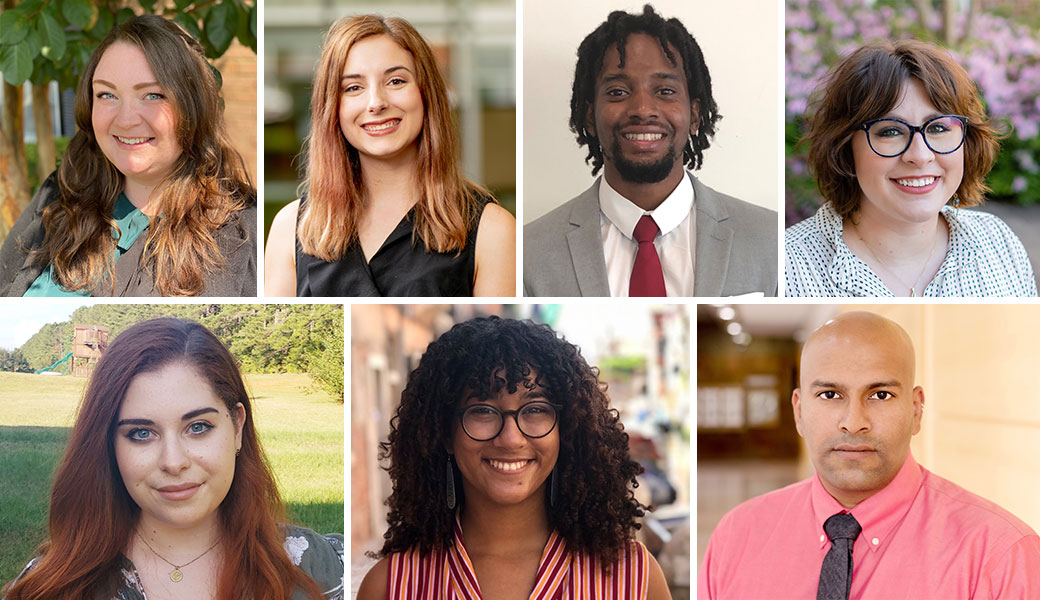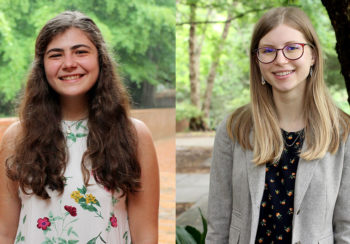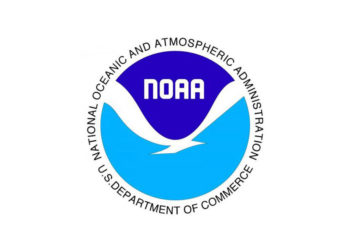Seven UGA doctoral students have been named 2021 ARCS Scholars by the Office of Research. Amanda Caulfield, Kendall Clay, Christian Freeman, Morgane Golan, Megan Meany, Judith Reyes Ballista and Aarya Venkat will receive $8,000 each for the next three years to support their dissertation research.
Venkat, a biochemistry Ph.D. student, is distinguishing how variations in conserved structural elements of an enzyme superfamily, called glycosyltransferases, contribute to changes in the enzyme’s function. One of Venkat’s goals is to connect these critical variations to disease outcomes, generating new targets for drug development.
“Being named an ARCS Foundation scholar is a great honor!” he said. “As a 2021 ARCS scholar, I’m elated to join an organization that prides itself on investing in values like diversity, equity and inclusion. I share that same sentiment and am excited to meet new peers and mentors. The intellectual and cultural exchange between fellow academics will be indispensable to me as I work toward becoming a professor who is committed to equity in the lab, as well as the classroom.”
Morgane Golan, a Ph.D. student in the Regenerative Bioscience Center, is investigating the potential of neural stem cell-derived extracellular vesicles for the treatment of traumatic brain injury in a piglet model. The goal of Golan’s research is to develop an effective, regenerative therapeutic for patients who have sustained a TBI.
“I am so grateful to be included in the 2021 cohort of ARCS scholars, and to connect with leading scientists across disciplines to promote the values of diversity and inclusivity in STEM,” Golan said. “The ARCS Foundation Award will help me accomplish more than just my research goals; this honor will set me on the path towards becoming the science communicator I aspire to be.”
Judith Reyes Ballista is a Ph.D. student in the Department of Infectious Diseases studying the role of lipids in the plasma membrane, such as phosphatidylserine in the budding process of vesicular stomatitis virus.
“Having a better understanding of how viruses exploit different mechanisms to enter and exit cells will help contribute to the development of enhanced vaccines,” she said. “Becoming an ARCS scholar is a fantastic opportunity to continue developing my skills to effectively communicate the science that we do in our field. This award will also provide the opportunity to network with outstanding peers committed to making science more accessible.”
Christian Freeman, a Ph.D. candidate in chemistry, is currently analyzing the phospholipids present in Staphylococcus aureus, a strain of bacteria known for growing in antibiotic-resistant infections each year. He hopes to bridge the connection between phospholipid composition, membrane fluidity, and membrane-active antibiotic activity.
“Establishing the purpose of membrane fluidity in antibiotic resistance would shift the playing field for drug delivery in many existing treatments today,” Freeman said. “Being a 2021 ARCS scholar will propel me forward into a new group of researchers who strive to better the world each day. Not only will I be able to dive deeper into external programs that require excess funding, I’ll also be a part of a like-minded group of individuals in which I can grow and communicate to accomplish a better outlook for our future.”
Kendall Clay, a Ph.D. student in neuroscience, is investigating genes that are important for the maintenance and regeneration of dopaminergic neurons in the asexual planarian Schmidtea mediterranea.
“My project has the potential to create a crucial foundation for the biological underpinnings of nervous system regeneration. This work can be applied not only to basic science, but also to human health, specifically Parkinson’s disease,” Clay said. “I am honored to be selected as a 2021 ARCS scholar and to be able to inspire others to pursue STEM education through my research and outreach.”
Megan Meany, a Ph.D. candidate in genetics, is investigating the genetic mechanisms underlying sex determination and gonad differentiation in the brown anole lizard Anolis sagrei. This research will be the beginning steps to large-scale comparative genomic studies and will reveal which aspects of anole sex determination and evolution are shared with humans.
“Being an ARCS Foundation Scholar will allow for my research to reach a broader audience, and I am excited to network and meet other scientists passionate about community outreach and science communication,” Meany said. “I look forward to all of the opportunities that the ARCS Foundation will bring me in the years to come.”
Amanda Caulfield, a Ph.D. student in infectious diseases, is investigating the role of a regulatory gene that is required for Bordetella pertussis immunomodulation. The goal of her project is to determine which aspects of human immunity are affected/manipulated by B. pertussis and identify new strategies for improved whooping cough vaccines.
“The scope of my work has potential to impact not just the Bordetella community, but also researchers in vaccine design and development,” Caulfield said. “I am thrilled to be a 2021 ARCS scholar, which will help extend my message on enhancing immunity to a fantastic pool of diverse young scientists who are focused on effective science communication.”
For the past 20 years, UGA has been a designated university of the ARCS Foundation. To address the country’s need for new scientists and engineers, the nonprofit foundation provides unrestricted funding to help the country’s brightest Ph.D. students create new knowledge and innovative technologies. To date, over 100 UGA students working in the sciences have received funding from the foundation totaling more than $2 million.






